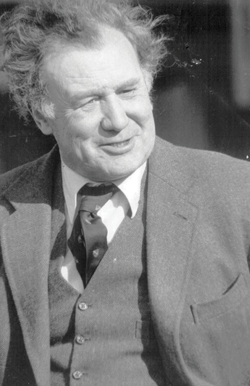Henry Clark
Henry Maitland Clark
11 April 1929 – 24 March 2012
MP for North Antrim 1959-1970
 One of the last of a generation of gentlemen unionist MPs, Henry Clark is mainly remembered for his defeat by Ian Paisley in the 1970 general election. A jovial character from among the Clarks of Upperlands, a renowned linen family, he was educated at Shrewsbury School, studied economics at Trinity College Dublin, and prepared for the Colonial Service at Trinity Hall, Cambridge.
One of the last of a generation of gentlemen unionist MPs, Henry Clark is mainly remembered for his defeat by Ian Paisley in the 1970 general election. A jovial character from among the Clarks of Upperlands, a renowned linen family, he was educated at Shrewsbury School, studied economics at Trinity College Dublin, and prepared for the Colonial Service at Trinity Hall, Cambridge.
His colonial career included postings as a district officer and district commissioner in Tanganyika, which now forms most of Tanzania. During that time, which he clearly enjoyed, he built up a rapport with its future President, Julius Nyerere.
Northern Ireland’s penultimate Prime Minister, James Chichester-Clark, and his brother Robin were among his cousins. Robin, who survives him, represented County Londonderry in Parliament (1955-1974) and rose to become Employment Minister in the Heath Government.
Clark’s own parliamentary career began with a resounding win: 94.9 per cent of the North Antrim vote and a 42,807-strong majority over his Sinn Féin rival. That majority fell to a still comfortable 22,986 at the 1966 election.
In his maiden speech, he described himself as a “comparative stranger” to a constituency which had “everything that is worth having in the United Kingdom, and I think that we have got it better.” Bushmills whiskey, Irish linen, eel and salmon fisheries, and its natural beauty stood out.
However, unemployment was an “absolute blot” on North Antrim and Northern Ireland as a whole. He sought an assurance that “Ulster will not be forgotten” in Westminster’s economic policies, although the Conservative Government of the day was usually indifferent. Ulster Unionist MPs continued to take the Tory whip at Westminster until direct rule was imposed.
Clark enjoyed constituency business but Africa was always close to his heart. He praised Tanganyika for making the “speediest and quietest move” to independence, and observed elections elsewhere in the continent. On Rhodesia, he suggested a short, sharp package of sanctions and explained that not all Rhodesians shared the views of their separatist Prime Minister Ian Smith.
Closer to home, the rise of Ian Paisley was turning the tide against him and the moderate unionism personified by Terence O’Neill, to whom Clark was a close supporter. Paisley won the Northern Ireland Parliament seat of Bannside in April 1970, after O’Neill’s resignation, and unseated Clark that June, with a majority of 2,679. A young Alasdair McDonnell was among the candidates.
The Paisley dynasty’s hold on North Antrim now makes Clark’s tenure a distant memory. There is a certain irony that his successor was then fiercely condemning reconciliation between unionists and nationalists, only to share power almost 40 years later. Clark had an excellent working relationship with Gerry Fitt and several TDs, while maintaining his loyalty to the Crown.
After his political career, Clark married Penelope Tindall (whose father took part in the wartime Great Escape) and worked for the Council for Small Industries in Rural Areas. He settled in Wiltshire and kept up his passions for Africa, Northern Ireland and the Anglo-Irish aspects of Dublin.
Friends and family remember him as larger than life, with the charm and common touch to make peace between disputing neighbours. Henry Clark died peacefully and is survived by Penelope, his daughters Christabell and Camilla, son Jamie and eight grandchildren.





